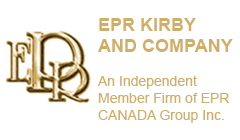


Frequently Asked Questions
Personal
Purchasing RRSPs is the most simple and acceptable method of deferring taxation until you are in a lower tax bracket. However, there are many rules and issues to consider when deciding if and how much you should contribute to an RRSP. Refer to our Quicktax document for important tax bracket and rate information, and contact your local EPR office for specific information for your situation.
Yes. CPP has allowed income splitting for many years. Now, you may also split other pension income that qualifies for the Pension Income Deduction. Some specific rules do still exist. Please consult the CRA website for guidance and/or call us for answers to specific questions you may have.
If the condition of your employment states that you need to incur certain expenses in order to earn your employment income, and your employer signs form T2200 specifying what expenses you are expected to incur, then you may be able to claim expenses on your tax return and reduce your taxable income.
The best rule of thumb is to provide everything to us so we can determine which receipts we need to complete your return. We will return items that are not required. Please refer to our Personal Tax Checklist for a list of items to provide.
EPR recommends that you keep all tax returns and supporting documentation for 7 years. In some cases, you may want to keep tax returns longer than that, because certain tax years may have specific information that you will need to refer to again at some point in the future. One such example is tax year 1994, when taxpayers were eligible to claim capital gains elections on certain capital property.
Business
Incorporating has a number of potential advantages, but it may not be the best strategy for everyone. Generally the advantages for incorporating a business are the potential for limited liability, tax savings or deferral, succession planning, income splitting, and the capital gains exemption on the sale of qualifying small business corporation shares. On the other hand, incorporated businesses must comply with more government regulations, so they are more expensive to maintain. There are many factors to consider, including your current income needs and your long term plans and goals. Generally it is best to sit down with a Professional Accountant and strategize the best plan based on your current information, as everybody’s situation is a little different.
The CRA requires you to register for GST/HST when your total worldwide taxable supply of goods and services exceed $30,000 in a year or in four consecutive calendar quarters. Once you register, other items to consider include the use of the quick/simple method or the conventional method, zero-rated and exempt supply and services, and the choice concerning filing dates and remittance dates. There is a lot of information available at the CRA website, but this is an area of your business where we recommend seeking professional advice.
As a proprietorship, you will be taxed on the net income of the business as it is reported on your personal income tax return, so there is no opportunity for dividends from a proprietorship.
As an incorporated entity, funds paid out can be reported as a salary or a dividend, a choice you should make with your Professional Accountant. Essentially, a fair salary can be paid to anyone providing services to the incorporated entity, and dividends can be paid to those who hold participating shares of the incorporated entity. The salary is tax deductible to the corporation, and a dividend is paid out only once corporate tax has been calculated on the net income of the corporation.
The first step is to open a Payroll Account at the CRA so that regular withholding remittances for CPP and Tax can be paid to the Receiver General. Next, determine what a fair salary is and calculate the deductions. Write the payroll cheque to yourself, and then on the 15th of the following month, write a cheque to the Receiver General for the amount withheld plus the employer’s portion of withholdings. Finally, prepare T4’s at the end of the year and report the payroll information to the CRA.
Generally, the CRA requires that you keep adequate records so that you can re-construct tax returns for up to the past six years. Consequently, we suggest you keep your supporting documents for seven years.
The Canadian Income Tax Act allows you to deduct expenses for the business use of a work space in your home, as long as you meet one of these conditions: (1) it is your principal place of business; or (2) you use the space only to earn your business income, and you use it on a regular and ongoing basis to meet your clients, customers, or patients.
Most businesses can claim an office in home amount. Please refer to our
Office in Home worksheet for the information we require.
Yes, if your spouse is not a partner in your proprietorship, you can pay him or her a reasonable salary for services performed. If you are incorporated and your spouse owns participating shares, you can both be paid a reasonable salary and/or dividends.
Any cost – including automobile operating costs – incurred by your business for the purpose of earning income may be deducted from the business income, subject to certain limitations by the Canadian Income Tax Act. Operating costs may include gas and oil, insurance, parking, repairs and maintenance, leasing costs, and loan interest. Limitations exist, however, so it’s best to consult a Professional Accountant for advice. The actual cost of purchasing a vehicle is not a direct expense, but annual capital cost allowance (amortization) may be claimed as the value of the asset diminishes over time.
Yes, a Business may deduct meals and entertainment costs as long as these represent costs incurred for the purpose of earning business income. The CRA requires that the receipts have documented information such as whom you met with, why you met with them, and the information you discussed at the meeting.
